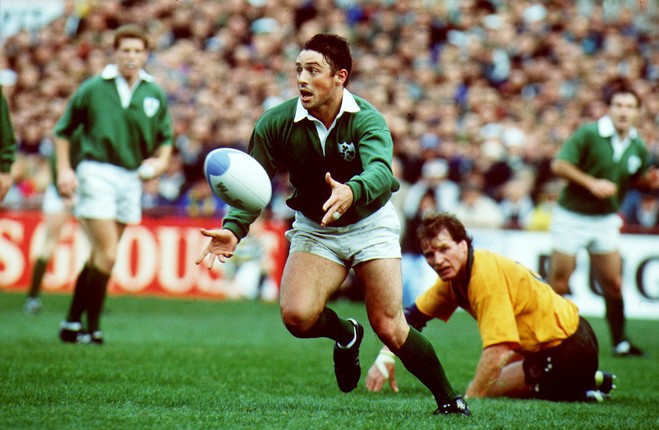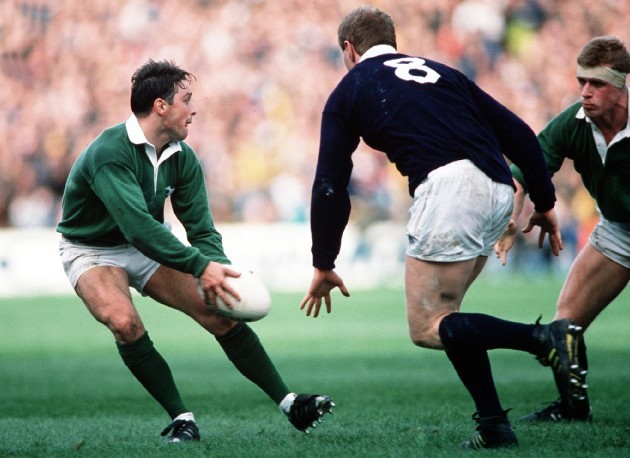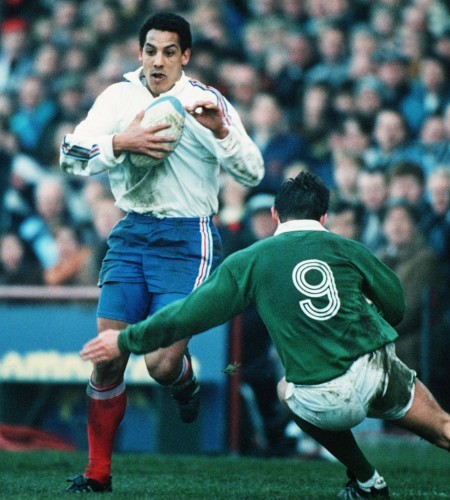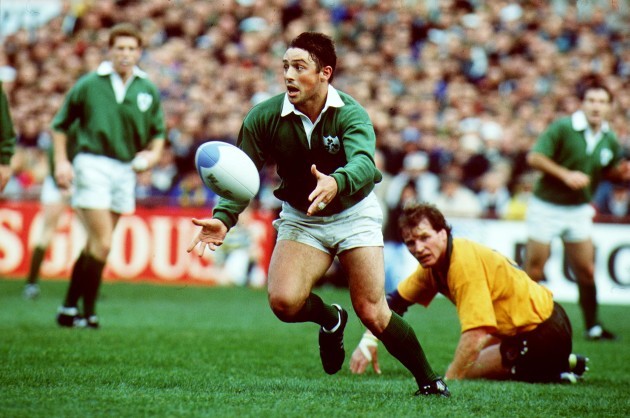Updated at 15.00
MANY COLUMN INCHES in the past few weeks have been given over to the question of who the best choice was to succeed Paul O’Connell as the Ireland rugby captain.
With O’Connell’s retirement following relatively quickly after those of Brian O’Driscoll, Ronan O’Gara and Stephen Ferris, Ireland had lost leaders of various types, but that’s not to say there was a shortage of prospective captains, either.
The perceived favourites were the eventual selection — Rory Best — and Jamie Heaslip, who was briefly skipper between the reigns of O’Driscoll and O’Connell. Jonathan Sexton was an outside bet while the candidacies of Seán O’Brien and Peter O’Mahony were also considered, and surely will be again.
Imagine, then, what the reaction would have been if Joe Schmidt had opted to make CJ Stander — an uncapped player, born abroad — his new captain. It may be hard to believe, but that’s exactly what happened just over 25 years ago.
An illustration of how times have changed over the course of a quarter-century is that Ireland’s Five Nations Championship opener with France was on 2 February and the starting team was announced on 14 January, following a three-and-a-half-hour selection meeting the day before.
The old joke used to be that it was harder to get off the Ireland team than get on it, but Ciarán Fitzgerald and his selectors made nine changes from the 20-18 win over Argentina in October.
Some of those alterations were enforced, including the absence through injury of captain Donal Lenihan. The Corkman had been skipper from 1986-88 but, upon taking over as coach from Mick Doyle, Jim Davidson opted to install Phillip Matthews as captain.
An ongoing virus in the 88-89 season prevented him from performing to his best though and Willie Anderson replaced him in the following campaign before Fitzgerald re-appointed Lenihan when he took over in the autumn of 1990. A trapped shoulder nerve sustained shortly after the Argentina game ruled Lenihan out of the Five Nations, however.
Rob Saunders — born in Nottingham but raised in Belfast — was just 22 years and five months old on that Monday morning when he received a phone call at 7.15am, just as he was about to head to work at engineering and construction firm MF Kent, where he was a marketing executive.
The scrum-half had been in excellent form in his first season for London Irish, scoring nine tries in 15 games as they stormed to the top of the English National 2.
As a result — and despite the fact that Andy Matchett was keeping him out of the Ulster team — he was included in the Ireland training camp in the Algarve in the first week in January and was selected on the ‘senior’ side in an intra-squad game, won 36-9 by the ‘juniors’ — for whom Alain Rolland, who made his debut against Argentina, was scrum-half.
Hearing Fitzgerald on the other end of the line, “I expected [him] to say, ‘You are not involved but if you practice, you can make it’,” as Cliona Foley reported in the Sunday Independent. Instead, he was informed that he was starting and would be captain.
Not first choice
Matthews had been the management’s first choice but he preferred to make sure that his game was right first and foremost and so a compromise was reached in that he would be pack leader.
Saunders was the first back to captain Ireland since Johnny Moloney — Fitzgerald’s assistant — in 1978. He wasn’t the youngest-ever Ireland captain, but there were only two younger.
In fairness to Saunders, his sporting pedigree was undeniable. His Scottish parents, Eric and Christine, both had qualifications in PE and lectured at the University of Ulster, Jordanstown, having both had trials for Scotland in hockey and rugby. As a student at Belfast’s Royal Academy, Saunders had Northern Ireland trials in soccer, was the Ulster schools shot putt champion, excelled at squash and was a fine cricket all-rounder too.
At such a young age, he was seen as not only a scrum-half for the 1991 World Cup but also that of 1995 and possibly 1999 too and it was his youth which swung the captaincy vote for him ahead of veterans Brendan Mullin and Michael Kiernan.
Ulster schools, Ireland schools, Queen’s University, the Irish Universities and Irish Exiles had all been skippered by him, along with the Ireland U21 side when Fitzgerald and Moloney were in charge.
There were four other debutants for the France game — Saunders’ clubmate Simon Geoghegan, Brian Robinson, Gordon Hamilton and Michael Galwey. With Ireland having sat out the first round of games, the French beat Scotland 15-9 and continued their good form in Dublin, triumphing 21-13 and starting what would be a 10-game winless run for Ireland in the competition.
Saunders’ crisp passing, his greatest asset, and tackling were praised in the press and then there was a 21-21 draw in Cardiff, but the 16-7 home defeat to England signified the end of the honeymoon.
A poor campaign was rounded off with a 28-25 defeat to Scotland and, ahead of the summer tour to Namibia, suggestions grew louder that Matthews would return as captain.
In a SundayIndependent piece, David Walsh quoted Saunders as saying,:
If the captaincy goes, it goes. There are kids lying in hospital beds who can’t walk. You can take ambition too far. But I have always been a competitive scrum-half and I will remain so. I am a one hundred percenter, I play to win.”
Matthews was announced as captain when the squad was picked but the tour was a disaster. Ireland lost the first test 15-6 and then Matthews succumbed to injury before the second test, with Saunders reinstated for what would be the final time in a 26-15 loss.
Despite pressure from Aherne for the scrum-half spot, Saunders did retain his place for the World Cup, getting his first — and what would prove to be only — wins for Ireland against Zimbabwe and Japan.
Final act
However, he was also the player whose poor clearing kick in the wake of Gordon Hamilton’s late try against Australia in the quarter-finals allowed the visitors to mount one last attack, which ended with Michael Lynagh’s game-winning try and conversion.
Saunders started the first game of the 1992 Five Nations, a one-point loss to Wales, but lost his place to Aherne for the remainder of the competition and saw Bradley leapfrog him to play in the two tests against New Zealand that summer and hold on to his place for the 1993 Five Nations.
Saunders was an unused replacement all through and in the 1994 championship though he did make one appearance from the bench that year, replacing an injured Bradley in Paris. Had tactical substitutions been allowed, he would surely have seen more action, but such a move wouldn’t be made until November 1996. As it was, in August 1994, a week after being included in an upcoming training squad, Saunders announced that he had decided to step back from representative rugby, citing the high level of commitment involved.
The game in Paris had been his 12th cap. Of the players to captain Ireland in the professional era, all finished with more than that, though Niall Hogan, another scrum-half, only eclipses him by one while Dion Ó Cuinneagáin won 19.
In fact, one has to go back as far as James Kelly, who played 11 times between 1962 and 64, to find the most recent captain with fewer caps.




